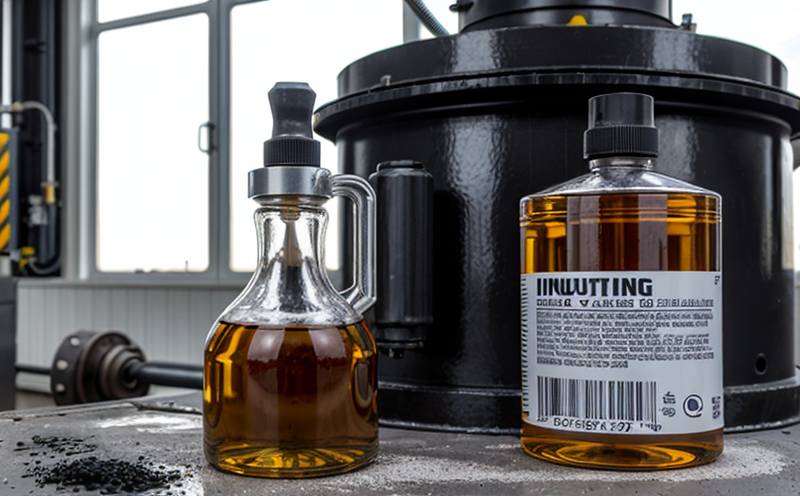ASTM D2270 Viscosity Index Testing of Oils
The ASTM D2270 method is a critical procedure used in the chemical testing industry to determine the viscosity index (VI) of industrial oils and lubricants. The VI provides insight into how an oil's viscosity changes with temperature, which is essential for ensuring that the oil maintains its performance across different operating conditions.
The ASTM D2270 test measures the change in kinematic viscosity between a reference temperature (usually 100°C) and a standard viscosity temperature (often 40°C). This data helps assess the thermal stability of an oil, which is crucial for optimizing its performance in various industrial applications. For instance, in aerospace or automotive sectors, maintaining consistent viscosity under varying temperatures can significantly impact engine reliability and efficiency.
The test begins with preparing a sample by thoroughly mixing it to ensure homogeneity. The prepared sample must then be degassed to minimize air bubble interference that could skew the results. Once ready, samples are placed into viscometers at specified intervals (typically 10°C apart) within the temperature range of interest. During this process, precise control over temperature and flow is paramount.
After acquiring viscosity data from each measurement point, these values are plotted against temperature on a graph. From this plot, the ASTM D2270 method calculates both the standard deviation (SD) and the regression line slope. The VI itself is derived by applying specific formulae to these calculated parameters. A higher VI indicates less change in viscosity with temperature, suggesting better thermal stability.
Understanding the importance of ASTM D2270 goes beyond just the immediate product performance; it also plays a role in broader compliance and quality assurance frameworks. For example, if an oil does not meet specified VI requirements, it may fail to perform as expected under high stress or temperature conditions, leading to potential equipment failures.
The ASTM D2270 method is widely recognized for its precision and reliability across various industries, including manufacturing, automotive, aviation, and industrial machinery. Its application in these sectors underscores the significance of maintaining consistent and reliable oil performance, which directly impacts operational efficiency and safety.
| Applied Standards | Description |
|---|---|
| ASTM D2270-18 | This standard specifies the procedure for determining the viscosity index of petroleum oils by measuring their kinematic viscosities at two temperatures. |
| ISO 3496:2015(E) | An alternative international standard that also provides methods for determining viscosity index based on similar principles as ASTM D2270. |
Why It Matters
The importance of ASTM D2270 Viscosity Index testing cannot be overstated. In industrial settings, where machinery operates under extreme conditions, the reliability and performance of lubricants are paramount. By ensuring that oils meet specific viscosity index requirements, industries can prevent costly downtime due to equipment failure.
For quality managers and compliance officers, meeting ASTM D2270 standards ensures that products adhere to international benchmarks, enhancing their reputation in the market. This is particularly crucial for companies operating globally or dealing with regulatory bodies like those enforcing ISO/IEC standards.
R&D engineers benefit significantly from this testing as it enables them to refine formulations and improve product performance. By understanding how viscosity changes under different conditions, they can enhance lubricant properties, leading to more efficient machinery operation and reduced maintenance costs.
From a procurement perspective, ensuring that purchased oils conform to ASTM D2270 standards helps avoid subpar products that might not meet the expected performance levels. This proactive approach ensures that all components within an industrial facility operate optimally, thereby contributing to overall productivity and safety.
Applied Standards
The ASTM D2270 Viscosity Index testing method adheres strictly to several international standards:
- ASTM D2270-18: This standard specifies the procedure for determining the viscosity index of petroleum oils by measuring their kinematic viscosities at two temperatures.
- ISO 3496:2015(E): An alternative international standard that also provides methods for determining viscosity index based on similar principles as ASTM D2270.
These standards ensure the accuracy and reliability of the testing process, making it a trusted method in industrial applications.
Competitive Advantage and Market Impact
- Enhanced Product Performance: Compliance with ASTM D2270 ensures that products meet rigorous standards, enhancing their reliability and performance. This can give companies a competitive edge by offering superior quality products.
- Global Acceptance: Adherence to international standards like ASTM D2270 fosters global acceptance of industrial oils and lubricants, broadening market reach.
- Safety Compliance: Ensuring product compliance with industry norms is critical for safety. Companies that meet these requirements can avoid recalls or legal issues associated with non-compliant products.
- Cost Efficiency: By using ASTM D2270-tested oils, industries can reduce maintenance costs and extend the lifespan of machinery through efficient lubrication.
The rigorous testing process not only enhances product quality but also promotes trust among customers and stakeholders. This is particularly valuable in sectors where reliability and safety are critical factors for business success.





